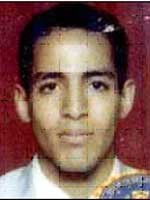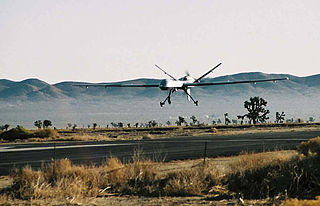In its war on terrorism in Yemen, the US government describes Yemen as "an important partner in the global war on terrorism". There have been attacks on civilian targets and tourists, and there was a cargo-plane bomb plot in 2010. Counter-terrorism operations have been conducted by the Yemeni police, the Yemeni military, and the United States Armed Forces.

Saif al-Adel is an Egyptian former military colonel, explosives expert, and a high-ranking member of al-Qaeda who is still at large. Adel is under indictment by the United States for his part in the 1998 United States embassy bombings in Kenya.

Fazul Abdullah Mohammed was a Comorian-Kenyan member of al-Qaeda, and the leader of its presence in East Africa. Mohammed was born in Moroni, Comoros Islands and had Kenyan as well as Comorian citizenship. He spoke French, Swahili, Arabic, English, and Comorian.
Nazih Abdul-Hamed Nabih al-Ruqai'i, known by the alias Abu Anas al-Libi, was a Libyan under indictment in the United States for his part in the 1998 United States embassy bombings. He worked as a computer specialist for al-Qaeda. He was an ethnic Libyan, born in Tripoli.

Abdullah Ahmed Abdullah was a high-ranking Egyptian member of al-Qaeda. He has been described as al-Qaeda’s most experienced operational planner and was said to be the second-in-command in the organization at the time of his death.

Muhsin Musa Matwalli Atwah was an Egyptian national wanted by the United States government.

Saleh Ali Saleh Nabhan was the leader of al-Qaeda in Somalia. He was listed on the FBI's third major "wanted" list, the FBI Seeking Information - War on Terrorism list, for his association with multiple attacks in Kenya in 2002, as well as his possible involvement in the 1998 United States embassy bombings, in which over 250 people lost their lives.
American counter-terrorism analysts justified the continued extrajudicial detention of many Guantanamo captives because they were suspected of staying in al-Qaeda safe houses, or guest houses—or because names matching theirs, or their "known alias" were found in the suspect houses.

Operation Enduring Freedom – Horn of Africa (OEF-HOA) is a component of Operation Enduring Freedom (OEF). The Combined Joint Task Force – Horn of Africa (CJTF-HOA) is the primary military component assigned to accomplish the objectives of the mission. The naval component is the multinational Combined Task Force 150 (CTF-150) which operates under the direction of the United States Fifth Fleet. Both of these organizations have been historically part of United States Central Command. In February 2007, United States President George W. Bush announced the establishment of the United States Africa Command which took over all of the area of operations of CJTF-HOA in October 2008.

The Battle of Ras Kamboni was a battle in the Somalia War (2006–2009) fought by the Islamic Courts Union (ICU) and affiliated militias against Ethiopian and the Somali Transitional Federal Government (TFG) forces for control of Ras Kamboni, a town near the Kenyan border which once served as a training camp for the militant Islamist group Al-Itihaad al-Islamiya.
Mustafa Ahmed Muhammad Uthman Abu al-Yazid, better known as Saeed al-Masri or simply al-Masri, was an Egyptian who was alleged to have acted as the financial chief for al-Qaeda. Along with Mahfouz Ould al-Walid and Saif al-Adel, al-Masri was believed to have opposed the September 11 attacks two months prior to their execution. He was killed in a targeted killing drone airstrike in Pakistan on May 21, 2010.

Al-Qaeda in the Arabian Peninsula, or AQAP, also known as Ansar al-Sharia in Yemen, is a militant Islamist group primarily active in Yemen and Saudi Arabia that is part of the al-Qaeda network. It is considered the most active of al-Qaeda's branches that emerged after the weakening of central leadership. The U.S. government believes AQAP to be the most dangerous al-Qaeda branch. The group established an emirate during the 2011 Yemeni Revolution, which waned in power after foreign interventions in the subsequent Yemeni Civil War.
Al-Qaeda has conducted operations and recruited members in Africa. It has included a number of bombing attacks in North Africa and supporting parties in civil wars in Eritrea and Somalia. From 1991 to 1996, Osama bin Laden and other al-Qaeda leaders were based in Sudan.

It is believed that members of Al-Qaeda are hiding along the border of Afghanistan and northwest sections of Pakistan. In Iraq, elements loosely associated with al-Qaeda, in the Jama'at al-Tawhid wal-Jihad organization commanded by Abu Musab al-Zarqawi, have played a key role in the War in Iraq.
The Baraawe raid, code named Operation Celestial Balance, was a helicopter assault by United States Special Operations Forces against the al-Qaeda-linked terrorist Saleh Ali Saleh Nabhan and associated al-Shabaab militants near the town of Baraawe in southern Somalia.
Abdullah Said al-Libi is described as being an al Qaeda operational leader in Pakistan. He is reported to have previously served in the Libyan military. He led an al-Qaeda paramilitary force. Said al-Libi was killed in a drone strike on 17 December 2009 in North Waziristan. In April 2009 he had released a statement where he identified himself as the leader of al Qaeda's efforts to take control of Khorasan - an ancient Islamic province that included Afghanistan, Pakistan, and some neighboring areas.

Mohammed Atef was the military chief of al-Qaeda, and was considered one of Osama bin Laden's two deputies, the other being Ayman Al Zawahiri, although Atef's role in the organization was not well known by intelligence agencies for years. He was killed in a US airstrike in November 2001.
Abdullah Abd al-Rahman Muhammad Rajab Abd al-Rahman, known as Ahmad Hasan Abu al-Khayr al-Masri, was an Egyptian al-Qaeda leader who has been described as the general deputy to al-Qaeda leader Ayman al-Zawahiri.

Beginning in the late 2000's, the United States Military has supported the Federal Government of Somalia in counterterrorism as part of the ongoing Global War on Terror that began in wake of the September 11th attacks. Support, mostly in the form of drone and airstikes, advising, training, and intelligence, increased during the Obama administration and Trump administration, with hundreds of drone strikes targeting the terrorist group al-Shabaab. Two U.S. special operations servicemembers and a CIA paramilitary officer have died during operations in Somalia.










